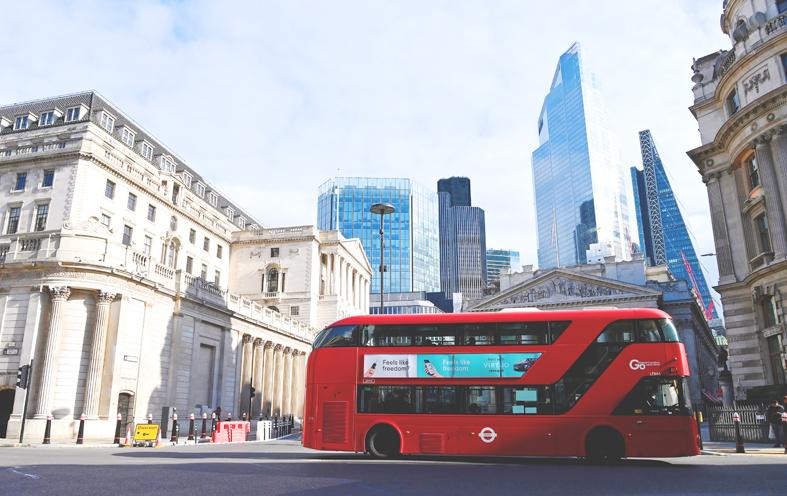The Bank of England has increased its monetary stimulus by a bigger than anticipated £150 billion (US$195 billion) as it tries to boost the economy amid new lockdown measures.
In a statement released yesterday, the central bank’s Monetary Policy Committee said that its challenge is to respond to the economic and financial impact of the resurgence of COVID-19, which has led to the reimposition of widespread restrictions across the UK.
A four-week lockdown began yesterday in England that will keep closed all shops selling items deemed to be non-essential, such as books and clothes, as the government seeks to contain a sharp increase in infections.

Photo: EPA-EFE
The other nations of the UK — Scotland, Wales and Northern Ireland — have also announced wide-ranging restrictions on economic activity.
The latest restrictions will batter an economy that had been just recovering from the sharp recession caused by a spring lockdown.
As a result, the Bank of England was widely expected to respond to the changed economic backdrop.
However, the increase in the bond-buying program is bigger than the £100 billion anticipated in financial markets.
The stimulus is aimed at keeping a lid on borrowing rates across the economy to boost lending as well as ensuring that money keeps flowing through the financial system.
The committee also kept its main interest rate unchanged at the record low of 0.1 percent.
The bank said that Britain’s economy would shrink by 11 percent this year, more severe than the 9.5 percent contraction it forecast in August.
GDP is likely to grow by 7.25 percent next year, weaker than a previous forecast of a 9 percent bounce-back, it said.
Britain’s economy, which as well as COVID-19 is facing the risk of a trade shock when its post-Brexit transition with the EU expires on Dec. 31, has been supported by a surge in debt-fueled spending by the government.
Despite the spending, Britain faces the sharpest peak-to-trough contraction of any G20 economy, Moody’s said on Oct. 16 when it cut Britain’s credit rating.
Additional reporting by Reuters

NEW IDENTITY: Known for its software, India has expanded into hardware, with its semiconductor industry growing from US$38bn in 2023 to US$45bn to US$50bn India on Saturday inaugurated its first semiconductor assembly and test facility, a milestone in the government’s push to reduce dependence on foreign chipmakers and stake a claim in a sector dominated by China. Indian Prime Minister Narendra Modi opened US firm Micron Technology Inc’s semiconductor assembly, test and packaging unit in his home state of Gujarat, hailing the “dawn of a new era” for India’s technology ambitions. “When young Indians look back in the future, they will see this decade as the turning point in our tech future,” Modi told the event, which was broadcast on his YouTube channel. The plant would convert

‘SEISMIC SHIFT’: The researcher forecast there would be about 1.1 billion mobile shipments this year, down from 1.26 billion the prior year and erasing years of gains The global smartphone market is expected to contract 12.9 percent this year due to the unprecedented memorychip shortage, marking “a crisis like no other,” researcher International Data Corp (IDC) said. The new forecast, a dramatic revision down from earlier estimates, gives the latest accounting of the ongoing memory crunch that is affecting every corner of the electronics industry. The demand for advanced memory to power artificial intelligence (AI) tasks has drained global supply until well into next year and jeopardizes the business model of many smartphone makers. IDC forecast about 1.1 billion mobile shipments this year, down from 1.26 billion the prior

People stand in a Pokemon store in Tokyo on Thursday. One of the world highest-grossing franchises is celebrated its 30th anniversary yesterday.

Zimbabwe’s ban on raw lithium exports is forcing Chinese miners to rethink their strategy, speeding up plans to process the metal locally instead of shipping it to China’s vast rechargeable battery industry. The country is Africa’s largest lithium producer and has one of the world’s largest reserves, according to the US Geological Survey (USGS). Zimbabwe already banned the export of lithium ore in 2022 and last year announced it would halt exports of lithium concentrates from January next year. However, on Wednesday it imposed the ban with immediate effect, leaving unclear what the lithium mining sector would do in the